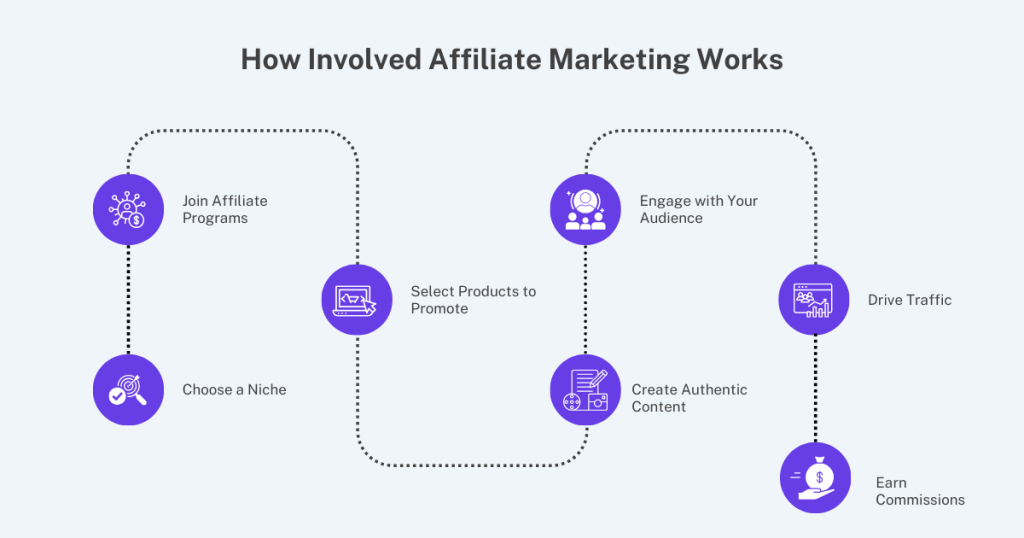Affiliate marketing has become increasingly popular and effective as a means for individuals and businesses to generate income online. Among the different types of affiliate marketing, involved affiliate marketing stands out due to its deep level of engagement and personal connection between the affiliate and the product or service they promote. In this comprehensive blog post, we will explore what involved affiliate marketing is, how it works, its benefits and challenges, and offer practical tips for success. By the end of this article, you will have a thorough understanding of involved affiliate marketing and how you can get started.
What is Involved in Affiliate Marketing?
Involved affiliate marketing refers to a type of affiliate marketing where the affiliate maintains a close relationship with the product or service they are promoting. The affiliate often uses, endorses, and has extensive knowledge about the product. This deep level of involvement allows the affiliate to create more authentic, trustworthy, and persuasive content that resonates with their audience. The goal is to leverage personal experiences and expertise to promote the product effectively and drive sales.
How Involved Affiliate Marketing Works
Involved affiliate marketing involves a few key steps, from selecting a niche to promoting products and earning commissions. Here is a detailed explanation of how it functions:

1. Choose a Niche
The first step in involved affiliate marketing is to choose a niche that you are passionate about and have experience in. This niche should be something you are genuinely interested in and knowledgeable about, as this will make it easier to create engaging and authentic content. For example, if you are a fitness enthusiast, you might choose a niche related to health and fitness products.
2. Join Affiliate Programs
Once you have selected your niche, the next step is to join affiliate programs that offer products or services related to your niche. Affiliate programs provide you with unique affiliate links that track sales generated through your promotions. Some popular affiliate networks include Amazon Associates, ClickBank, CJ Affiliate, and ShareASale.
3. Select Products to Promote
After joining affiliate programs, you need to select products or services to promote. Choose products that you have used or are currently using and that you genuinely believe in. Your personal experience with the product will help you create more authentic and convincing content.
4. Create Authentic Content
Creating high-quality, authentic content is crucial in involved affiliate marketing. This content can manifest in various forms, including blog posts, videos, social media posts, or email newsletters. The key is to share your personal experiences, reviews, and insights about the product. For example, if you are promoting a fitness supplement, you might create a video demonstrating how the supplement has improved your workouts and overall health.
5. Engage with Your Audience
Engagement is a vital aspect of involved affiliate marketing. Engage with your audience by responding to comments, addressing questions, and actively participating in discussions relevant to your niche. Building a community around your niche fosters trust and loyalty, making it easier to promote products.
6. Drive Traffic
To generate sales and earn commissions, you need to drive traffic to your content and affiliate links. There are various ways to do this, including search engine optimization (SEO), social media marketing, email marketing, and paid advertising. The goal is to attract visitors to your content and encourage them to click on your affiliate links.
7. Earn Commissions
Benefits of Involved Affiliate Marketing
Involved affiliate marketing offers several advantages, making it a popular choice among affiliates. Here are several key benefits:
1. Higher Trust and Credibility
Since involved affiliate marketing involves promoting products that you have personal experience with, it helps build trust and credibility with your audience. They are more likely to trust your recommendations and make a purchase based on your genuine endorsement.
2. Improved Conversion Rates
Authentic and personal content often leads to higher conversion rates. When your audience sees that you genuinely believe in the product and have had positive experiences with it, they are more likely to be convinced and make a purchase.
3. Enhanced Content Quality
Having a close relationship with the product allows you to create more detailed and informative content. You can share personal insights, tips, and experiences that add value to your audience and make your content more engaging.
4. Long-Term Relationships
Involved affiliate marketing allows you to build long-term relationships with your audience. As you consistently provide valuable content and authentic product recommendations, your audience will trust your suggestions and continue to follow your content.
5. Personal Satisfaction
Promoting products that you genuinely believe in and use can be personally satisfying. It allows you to share your passion and knowledge with others while earning income.
Challenges of Involved Affiliate Marketing
While involved affiliate marketing offers many benefits, it also comes with its own set of challenges. Here are several challenges you might come across:
1. Time-Consuming
Creating high-quality, authentic content can be time-consuming. It requires continuous effort and creativity to share personal experiences and engage with your audience regularly.
2. Limited Product Selection
Since involved affiliate marketing involves promoting products that you have personal experience with, it may limit the range of products you can promote. Finding products that align with your niche and that you genuinely believe in can be challenging.
3. Competition
Popular niches often come with high competition, which can make it challenging to distinguish yourself. To succeed, you need to develop unique and high-quality content that differentiates you from other affiliates.
4. Keeping Up with Trends
Niches can evolve, and new products and trends may emerge. Staying updated with the latest developments in your niche is essential to remain relevant and provide up-to-date information to your audience.
5. Balancing Promotion and Value
It’s crucial to strike a balance between promoting affiliate products and providing valuable content. Over-promotion can turn off your audience, while too little promotion may not generate sufficient commissions.
Tips for Success in Involved Affiliate Marketing
To succeed in involved affiliate marketing, consider the following tips:
1. Choose a Passionate Niche
Selecting a niche that you are passionate about will make content creation more enjoyable and sustainable. Your passion for the topic will be evident in your content and will resonate with your audience.
2. Research and Select High-Quality Products
Take the time to research and select high-quality products that you genuinely believe in. Search for products that have positive reviews, offer competitive commission rates, and fulfill a demand in the market.
3. Create Valuable Content
Focus on creating valuable and informative content that addresses the needs and interests of your audience. This could include how-to guides, product reviews, tutorials, and informative articles.
4. Share Personal Experiences
Share your personal experiences and stories related to the products you promote. Authentic and personal content builds trust and credibility with your audience.
5. Optimize for SEO
Implement SEO strategies to enhance your content’s visibility in search engine results. Utilize relevant keywords, establish high-quality backlinks, and ensure your website is user-friendly and mobile-responsive.
6. Utilize Multiple Marketing Channels
Diversify your marketing efforts by using multiple channels such as social media, email marketing, and paid advertising. This strategy helps to reach a broader audience and reduces dependence on a single traffic source.
7. Build an Email List
Building an email list enables you to cultivate relationships with your audience and promote affiliate products directly to them. Use lead magnets such as free ebooks, webinars, or exclusive content to encourage sign-ups.
8. Engage with Your Audience
9. Monitor and Analyze Performance
Regularly monitor and analyze the performance of your marketing campaigns to ensure effectiveness. Use analytics tools to track traffic, conversions, and ROI. Make data-driven decisions to optimize your efforts and improve results.
10. Stay Updated
Stay updated with the latest trends, tools, and techniques in affiliate marketing and your niche. Join affiliate marketing forums, read industry blogs, and participate in webinars to stay informed.
11. Be Transparent
12. Test and Experiment
Continuously test different strategies, ad copies, and marketing techniques. Experiment with new approaches to find what works best for your audience and niche.
Tools and Resources for Involved Affiliate Marketing
To excel in involved affiliate marketing, affiliates can leverage various tools and resources:
1. Affiliate Networks
2. Content Management Systems
Using a content management system (CMS) like WordPress makes it easy to create, manage, and publish content. WordPress provides a wide array of plugins and themes that enhance both the functionality and design of your website.
3. SEO Tools
Tools such as Moz, Yoast SEO, and Ubersuggest are instrumental in optimizing your content and enhancing search engine rankings.
4. Analytics Tools
Google Analytics, SEMrush, and Ahrefs are valuable tools for tracking and analyzing the performance of your marketing campaigns. They provide insights into traffic, conversions, and user behavior.
5. Email Marketing Software
Email marketing platforms like Mailchimp, AWeber, and ConvertKit enable you to build and nurture your email list. They offer automation features, templates, and analytics to enhance your email marketing efforts.
6. Social Media Management Tools
Tools like Hootsuite, Buffer, and Sprout Social help manage and schedule social media posts. They provide analytics and engagement features to streamline your social media marketing.
7. Content Creation Tools
Canva, Grammarly, and BuzzSumo are invaluable tools that significantly enhance the creation of high-quality content and visuals. Canva offers design templates, Grammarly helps with grammar and style, and BuzzSumo provides content ideas and trends.
8. Web Hosting Services
Reliable web hosting services like Bluehost, SiteGround, and HostGator ensure your website runs smoothly. They offer features like fast loading times, security, and customer support.
9. Landing Page Builders
Platforms like Leadpages, Unbounce, and ClickFunnels enable you to create effective landing pages for your affiliate products. Landing pages can improve conversion rates by providing detailed information and a clear call to action.
10. Training and Courses
Investing in affiliate marketing courses and training programs can enhance your skills and knowledge. Look for reputable courses that cover topics like SEO, content creation, and email marketing.
Conclusion
Involved affiliate marketing offers a unique and effective way to earn income online by promoting products or services that you have a close relationship with. By choosing a niche, joining affiliate programs, creating authentic content, and engaging with your audience, you can build a successful involved affiliate marketing business.
The benefits of involved affiliate marketing, such as higher trust, improved conversion rates, and enhanced content quality, make it an attractive option for many affiliates. However, it also comes with challenges like time-consuming content creation and competition.
To succeed, focus on choosing a passionate niche, creating high-quality content, optimizing for SEO, and engaging with your audience. Utilize various tools and resources to enhance your efforts and stay updated with industry trends.
By following the tips and strategies outlined in this guide, you will be well-equipped to navigate the world of involved affiliate marketing and achieve your financial goals. With dedication, persistence, and a strategic approach, you can build a profitable and sustainable affiliate marketing business that leverages your personal experiences and expertise.



